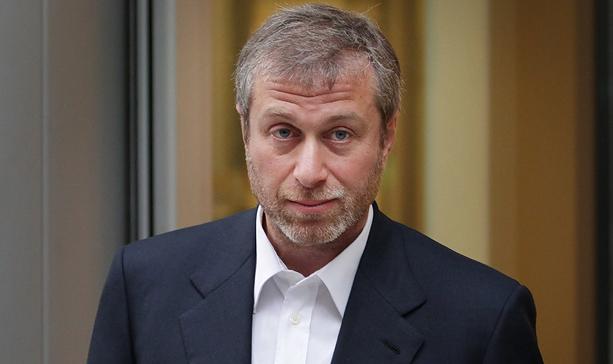Two of the world's richest men are facing off in court, and the fireworks might offer a window into the lives of the super-wealthy who dominate the art market. Exiled Russian oligarch Boris Berezovsky is suing billionaire Roman Abramovich for $6.5 billion in London's High Court of Justice. It's been called the biggest private litigation of all time and has exposed corrupt dealings in the carving-up of national industries in post-Soviet Russia.

Roman Abramovich / Courtesy Getty Images
The heart of the case revolves around exorbitant payments that Abramovich made to Berezovsky starting in the early 1990s. Abramovich alleges that these sums represented access to government support and protection for his business -- what is known in Russian as "krysha," which literally means "roof." Berezovsky, 65, acknowledges peddling political influence but also claims that he had partial ownership in Abramovich's oil company Sibneft and his aluminum company Rusal and that, when his political fortunes faltered, Abramovich forced him to undersell his stake in the companies.
Abramovich, 45, is notoriously protective of his privacy -- and even tight-lipped about the artworks that he buys in consultation with his companion Dasha Zhukova -- and these court proceedings have exposed more about his life than ever before. It's clearly an unpleasant experience for him -- he has called Berezovsky a "megalomaniac" for whom "the boundaries between fact and fiction are blurred." Meanwhile, during his own testimony Berezovsky questioned Abramovich's intelligence and suggested that he owed his success to his ability to ingratiate himself to the powerful: "He is good at appearing to be humble," said Berezovsky. "He is happy to spend days just socialising with important or powerful people if that is what is needed so [that] he can get closer to them."
Here is ARTINFO France's run-down on some interesting details that have come to light about the man behind some of the biggest art-market sales of all time.
HE CAME FROM HUMBLE BEGINNINGS
In his deposition, available on the Guardian's Web site, Abramovich states that he was orphaned at an early age and raised by relatives. After high school, he began his studies at the Industrial Institute of Ukhta and was then drafted into the army. After his military service, he resumed his studies, but didn't graduate, going into business for himself in 1987 when Mikhail Gorbachev's policy of perestroika allowed for the creation of small businesses. Abramovich's first company made plastic toys for children, including rubber ducks.
HIS BUSINESS CONCERNS ARE WIDE-RANGING
Abramovich glosses over his transition from rubber ducks to petroleum refineries in his statement. Among the business interests mentioned are petroleum products, mineral fertilizers, cement, electricity, aluminum, automobile manufacturing, the Russian airline Aeroflot, food processing, retail, insurance, steel production, and gold mining. He was governor of the Russian province of Chukotka from 2000-2008. During that time, we learn, "the region became the second largest gold producing area in Russia."
HE GAVE AN AWFUL LOT OF MONEY TO BEREZOVSKY
According to the New York Times, Abramovich and Berezovsky met frequently in far-flung locales, including the Riviera, the French Alps, London, airports, private planes, and luxurious yachts. Abramovich said in court that he paid Berezovsky's girlfriend's credit card bills, bought him a house in the south of France, and gave him $305 million "to be able to establish himself properly abroad." Abramovich has also described making payments to Berezovky of $80 million in 1996, $50 million in 1997 and 1998, and $80 million in 1999, dropping off bags containing up to $5 million in cash at Berezovsky's Moscow office and club, the Guardian reports.
HE STILL CLAIMS TO RESIDE IN RUSSIA
Abramovich, who owns seven homes in England, states in his deposition that he resides in Russia and "finds it odd" that Berezovsky has claimed that he lives in the country. He adds that he decided not to challenge the filing of the lawsuit in the U.K. because he knows that Berezovsky cannot return to Russia, "having been convicted of defrauding money from the Russian company Aeroflot."
HE IS JUST A SIMPLE BILLIONAIRE
Abramovich also stated that he was surprised by Berezovsky's "extravagant lifestyle" and was "never interested in imitating this lifestyle." Abramovich recently declared his net worth to be $17.78 billion and owns several houses in various countries, the Chelsea Football Club, and the world's largest yacht, which has a laser defense system to deter paparazzi. Berezovsky's lawyer pressed him as to whether this lifestyle should actually be considered extravagant. "Well, yes, possibly," Abramovich replied, according to the Guardian. "I agree, yes, that one could put it that way."
HE DOESN'T FEEL COMFORTABLE TESTIFYING IN ENGLISH
Despite his many UK ties, Abramovich prefers to testify in his native Russian and rely on an interpreter (perhaps understandably, given the complexity of the financial transactions described in the case). Berezovsky, on the other hand, has testified in English, a fitting sign of assimilation to the country that granted him asylum after his fall from grace in Putin's Russia.
HE HAS MESSY HANDWRITING
If there's no paper trail, Abramovich told the judge, then it's because "I myself never make any notes," UKPA reports. "Usually if I write something down, I can't read it afterwards."
HE IS SPARING NO EXPENSE TO PAY FOR HIS DEFENSE
There is speculation that Abramovich's chief attorney, Jonathan Sumption -- who told the court that the lawlessness of post-Soviet Russia should be compared to medieval England -- is earning between £3-10 million ($4.8-16 million) for his work on the case, according to the Guardian.
-Kate Deimling, ARTINFO
More of Today's News from ARTINFO:
Parallels in Protest: How Philip Glass's Gandhi Opera Relates to Occupy Wall Street
Like what you see? Sign up for ARTINFO's daily newsletter to get the latest on the market, emerging artists, auctions, galleries, museums, and more.